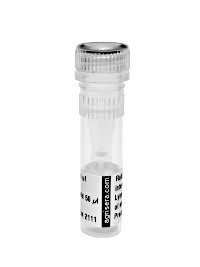1

Anti-Cytokinin | N6-isopentenyladenosine (5 mg)
AS09 434 | Clonality: Polyclonal | Host: Rabbit
- Product Info
-
Immunogen: BSA-conjugated, via ribose, N6-isopentenyladenosine
Host: Rabbit Clonality: Polyclonal Purity: Total IgG. Protein G purified in PBS. Format: Lyophilized Quantity: 5 mg Reconstitution: For reconstitution add 70 µl of sterile water Storage: Store lyophilized/reconstituted at -20°C; once reconstituted make aliquots to avoid repeated freeze-thaw cycles. Please remember to spin the tubes briefly prior to opening them to avoid any losses that might occur from material adhering to the cap or sides of the tube. Tested applications: ELISA (ELISA), Radioimmunoassay (RIA) Recommended dilution: 2-10 µl/15 ml; Specific information about dilution is going to be included on the vial - Reactivity
-
Confirmed reactivity: N6-isopentenyladenosine Predicted reactivity: N6-isopentenyladenosine Not reactive in: No confirmed exceptions from predicted reactivity are currently known - Additional Information
-
Additional information: Cytokinin | N6-isopentenyladenosine (5 mg) - Background
-
Background: Cytokinins (CK) belong to a class of plant growth substances (plant hormones) which promote cell deivision by means of local and long distance signalling.Zeatin is an adenine-type cytokinin synthesised in stems, leaves and roots.
- Protocols
-
Molar corss-reactivities of different cytokinins and related compounds with anti-cytokinin antibodies.
Abberviation "Ab" means antibody; ZR-trans-zeatin riboside; cZR-cis-zeatin riboside; iPR-N6-isopentenyladenosine, DZR-dihydrozeatin riboside; BAPR-N6-benzyladenosine; mTR-meta-topolin riboside; oTR-ortho-topolin riboside; KR-kinetin riboside
Aqueous Coupling of Antibodies to a Gel.
Material and equipment required for coupling antibodies to Affi-Gel 10 and Affi-Gel 15 gel under aqueous conditions.
1.Cold distilled water.
2.Coupling buffer of your choice without primary amines or sulfhydryl groups; 10-100 mM HEPES, MOPS, POPSO, acetate, or bicarbonate for antibodies.
3.Closed container which holds at least four time the volume of gel.
4.(Optional) rotating shaker.
5.(Optional) Buchner funnel.
6.Affi-Gels (Bio-Rad).
Shake the vial containing gel, and make sure that you have a uniform suspension. Transfer the desired quantity of slurry to a Buchner funnel or glass-fritted funnel. Drain the supernatant solvent, and wash the gel with three bed volumes of cold 10 mM sodium acetate, pH4.4, or cold (4ºC) deionised water. It can be facilitated, particularly when working with larger amounts of gel, by applying a vacuum. Care should be taken, however, not to allow the gel bed to go dry. For optimum coupling of antibodies, the washing procedure should be completed and the gel combined with the antibody solution within 20-min. Transfer the moist gel cake to a test tube or flask and add cold antibody solution in the coupling buffer. The antibody concentration cannot be greater than 30 mg protein/ml gel. Add at least 0.5 ml of antibody solution per ml of gel (optimum 1.5 – 4.5 ml), and agitate sufficiently to make uniform suspension. Continue gentle agitation of the gel for 1 hour at room temperature or 4 h at 4ºC. The rest of reactive ester groups are eliminated by adding of 0.1 ml 1 M glycine ethyl ester (pH 8) or 0.1 ml 1 M ethanolamine HCl (pH 8) per ml gel. Allow 1 hour for completion of the blocking reaction. Transfer the gel to a column and wash with water or 5 ml coupling buffer per 1 ml gel. The column is now ready for equilibration with starting buffer and application of sample. When not in use, store the columns at 4ºC, and in a starting buffer containing 0.1% sodium azide.Enzyme-linked immunosorbent assay.
The microtiterplates (for purchase please inquire) are coated with 150 µl of rabbit anti-cytokinin antibodies (5 µg /ml-1 50 mM NaHCO3, pH 9.6). The wells are washed with distilled water, filled with 200 µl of bovine serum albumin solution (0.04 g.l-1) and incubated for 1 h at 25ºC. After decanting and 2 washes with dist. water, the wells are filled in the following sequence: 50 µl TBS, 50 µl of standard or sample in TBS, and 50 µl of cytokinin-alkaline phosphatase tracer diluted in TBS-bovine serum albumin buffer (0.04 g.l-1). Non-specific binding is determined by adding an excess (200 pmol) of cytokinin standard; for maximum tracer binding (Bo), TBS is used instead of standard. After 1 min shaking, the plates are incubated for 1 h at 25ºC (or 37ºC). The decanted plates are then washed 4 times with TBS and filled immediately with 150µl of a p-nitrophenylphosphate solution (1 mg.ml-1 50 mM NaHCO3, pH 9.6). The reaction is stopped after 1 h incubation at 25ºC by adding 50 µl 5N KOH and the absorbance measured at 405 nm in a vertical spectrophotometer. A computer programme could be used for assay evaluation and computation of results. Sigmoidal curves for standards, cross-reacting compounds, and dilution analysis can be linearised by log - logit transformation as follows: logit B/Bo = ln (B/Bo)/(100-B/Bo)
The cytokinin values obtained by the ELISA of the fraction(s) containing [2-3H] labelled cytokinin are corrected by the appropriate cross-reactivity and recovery values to obtain estimates of cytokinin levels in plant tissue (expressed as cytokinin equivalents). If there is any spread of radioactivity into a second fraction, the cytokinin content could be estimated from the fractions containing radioactivity. - Reviews:
-
This product doesn't have any reviews.
Accessories

AS09 446 | Clonality: Polyclonal | Host: Rabbit | Reactivity: Arabidopsis thaliana, Eucalyptus globulus, Pinus radiata

AS06 193 | Clonality: Polyclonal | Host: Rabbit | Reactivity: IAA | Indole 3 acetic acid
Sold out. Other antibodies to IAA can be found here.


